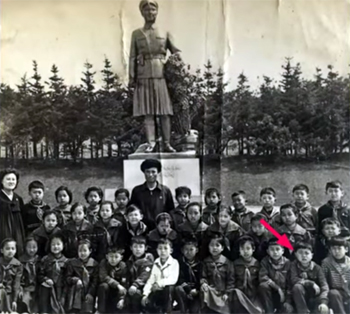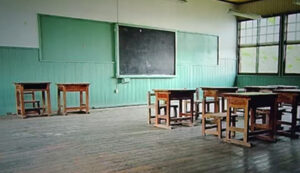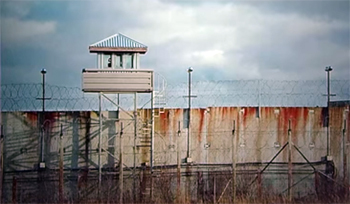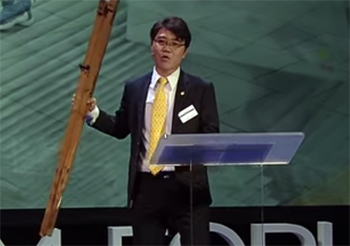By Mark Ellis —

In one of the more touching moments of President Trump’s State of the Union speech on January 30th, he honored a North Korean defector, whose indomitable will for survival and freedom propelled his escape from his troubled country.
In the 1990s, severe famine caused by government ineptitude, “biblical” floods, and the loss of Soviet support led to as many as 4.0 million deaths by starvation. One man’s hunger caused him to overcome enormous obstacles in a long trek to freedom.
“After 1994, many people from my hometown died from starvation, including my classmates,” says Ji Seong-Ho, who testified about his ordeal at the Oslo Freedom Forum. Ji was in middle school at that time, and began to notice more and more empty chairs in front of the desks where his schoolmates once sat.

North Koreans resorted to extreme measures to fight their hunger. “There were those who tried to prolong life by eating tree bark and grass, but they too ended up dying,” he recalls.
“The public distribution system had broken down and Kim Jong-il withheld food from the hungriest parts of my country, intentionally starving us to death,” he alleges.
A political prison known as Camp 22 was located at the outskirts of his hometown, situated near a coal mine, where prisoners mined 1200 tons of coal every day. Ji discovered it was possible to steal coal by climbing aboard a freight train that hauled coal from the camp.
“I would go out at night with my mother and younger sister, who was 12, to gather coal. We would grab on to the train as it sped by or sneak aboard as it departed the station.”
“I can still feel the weight of my coal sack,” which was almost as heavy as the young lad. At 14-years-old, Ji

weighed only 45 pounds and stood just four feet, two inches tall, due to the effects of prolonged malnutrition.
One early morning in March, 1996, while it was still dark, things went horribly wrong for Ji. When he climbed aboard a moving car, he immediately noticed several other thieves aboard the train — just like himself — secretly loading sacks with coal.
“Their entire bodies were black from soot, sweat and coal dust,” he recalls. Ji was dizzy because he had not eaten in several days. Before the train entered the next station where he planned to jump off, he blacked out.

When he awakened he was in terrible pain. “The train had passed over my left leg and it was hanging from the rest of my body by just a tendon.” As blood gushed out, he grabbed at his leg to stop the flow, then was startled by the fact that three fingers had been cut off his left hand.
A copious flow of blood gushed from his mangled body parts. Ji cried out to his mother and father to save him as sub-zero temperatures intensified his pain.
Eventually his sister found him and alerted several friends who carried Ji to a hospital. North Korea has a national health care system where services are provided for free, but some defectors have alleged that services exist only for those who can pay. Their system is filled with shortages of essential medicines and equipment.
Ji wept as he described the treatment he received in the hospital, apparently with little or no anesthetic. “I still remember very vividly the sound of the saw cutting through my leg bone and the vibration it caused throughout the rest of my body. The doctor slapped me to keep me from passing out.”
The young man was sent home without any medicine or drugs to control his pain, which was excruciating. “Every night I cried out in pain, whispering ‘please kill me’ repeatedly.”
With the family still starving, his younger brother scavenged in trash bins to find leftover scraps of noodles, which he fed by hand into his older brother’s mouth. “He and my sister resorted to eating grass and wild mushrooms while I recovered,” he says.
When summer arrived, the flesh around his amputation turned gangrenous, and a horrible stench irritated his nostrils. Pieces of his leg bone began to protrude through the inflamed skin.
After 240 days of agony, the pain finally subsided and he had to deal with his new reality. “I was a cripple, like the ones I used to taunt when I was a younger kid. I thought there was no more future for me; I thought about killing myself.”
When Ji turned 18, he used his crutches to cross into China in search of food and managed to find a few kilograms of rice. While there, he was astonished to discover that dogs ate better in China than his family did in North Korea.
On his way back, carrying the rice to help feed his family, he was captured by local police.
“A worthless cripple like you is embarrassing our nation,” they shouted at him. “You have defamed and damaged the dignity of the Dear Leader.”
“They took all my rice and tortured me,” he recounts. The police beat him more severely because he was crippled, which added insult to all his injuries. “That injustice motivated me to leave North Korea. With my brother, I planned my escape.”
The arduous journey
The two men traveled north to cross the Tumen River. On the night of their escape, Ji almost drowned when he hit a deep seam in the river and began to flounder, swallowing water in desperate gulps. His brother lunged toward him, grabbed Ji by the hair and pulled him ashore.
Using crutches, hobbling on one leg, Ji embarked on a 6000-mile journey that took him through the jungles of Southeast Asia, across Laos, Burma, and eventually to Thailand, with the help of an underground network.
He and his brother separated not long after they arrived in China. They reasoned that if they were caught together, they might both be executed, so it would be better if they traveled apart.
It took Ji a month to cross the countryside of China, mostly on foot, occasionally using other modes of transportation.”At one point I had to cross a mountain in Laos and I became discouraged because it was a steep jungle area and I had to climb on my crutches,” he told The Bush Center in a separate appearance.
“At one point I thought I might die there in the jungle because I had no strength left to carry on. Ji began to weep. Why am I here? What am I here for? he asked himself.
“I was in so much pain I literally wanted to die. Ji lifted up a prayer to heaven, “If there is a God in this world, please save me,” he cried.”If you do, I will go to South Korea and lead the best life I can.”
Ji’s prayers were answered, because he made it safely to Thailand. In 2006 he arrived in South Korea, where he was thrilled to receive a prosthetic leg from the government. Ji believes God helped him in his journey to freedom.
“I wanted to share this joy with my father and bring him to this great world of happiness,” he says. But he learned that after he and his brother left, his mother and sister also defected. Then police came and arrested Ji’s father. “They tortured him to death and then carried him in a wheelbarrow and left him in our empty house.”
In South Korea, Ji achieved the dream of obtaining a university education. After his graduation, he founded a

group called Now, Action and Unity for Human Rights. In the last four years, his group has rescued 100 North Korean children, disabled people and young women, providing safe passage for them to South Korea and helping them get established.
As Ji concluded his talk at the Oslo Freedom Forum, he held his crutches aloft – the same ones that helped him journey 6,000 miles — which his father made for him before his untimely death.
“I have come from the brink of death to triumph against all odds!” he exclaimed. “A free North Korea is possible if we pursue it with determination.”




Very moving account. I had heard it on You Tube a long time ago, and it is worthy of hearing again. So glad that the Lord put it in his heart to pray. God is gracious.
So sad his dad was murdered. His father was very kind to ake the crutches, especially considering he too was weak with hunger and probably only had very limited tools.
I hope this young man lives a blessed life and eternity.
Comments are closed.